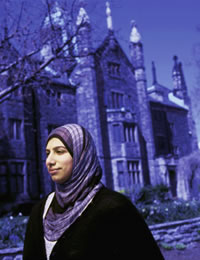Ausma Malik will graduate in 2006 with an honours BA in international relations and minors in political science and history. Active outside of the classroom, Malik volunteered with Students for Literacy and the U of T food bank, and edited the Undergraduate Political Science Journal. She was also involved with student government. With four years to look back on, we asked her what she thought of U of T.
What is the most important thing you got out of your experience at U of T? I met really interesting people, both in my classes and outside them. Professor McConnelly’s course in the politics of development helped ground my interest in urban development and the urban-rural divide. The campus has its own sense of community, but if you need a break from that, there’s so much going on in Toronto.
What do you think you’ll remember most about your time at U of T? I joined the Students’ Administrative Council and got involved with equity and social justice issues. Most people, when they think of equity issues, think of gender or race, but we also advocated for on-campus child care and lower tuition, which are equity issues. We held a fundraising dinner for the victims of the Pakistan earthquake, and hosted a forum for black youth on gun violence. It’s hard to choose just one event.
What do you think is the key to enjoying life at U of T? Maintaining a sense of balance. I swung between being very focused on academics and being very not focused on academics.
How do you think you’ve changed over the past four years? I think I consider ideas more analytically and critically. I hope I’ve become a better thinker.
How would you describe the class of 2006? What are their biggest concerns? Well, I can’t speak for everyone in my year, but personally I’m concerned with environmental issues and sustainable development. Most people I know want to do something to improve the world. That’s probably not unique to the class of 2006, but comes with being a young person.
One of the biggest concerns for students right now is paying for education. Students who take the initiative to work to pay for school could contribute more to campus life if they didn’t have to worry so much about making ends meet.
What do you think U of T can do to serve its students better? The campus lacks a sense of community. One of the biggest complaints is that there isn’t a place to just hang out. We have so many libraries, but something akin to a student centre would be welcomed.
What advice would you give to the class of 2010 starting in September? Don’t be intimidated. Don’t let any barriers stop you from getting the most out of your time here. This is an amazing place, and four years at university can change your life.
What’s your next step? I’d like to travel. These past few years have taught me a lot, but I think travelling helps you appreciate your education, and it gives you perspective. I’d like to visit Africa, the Middle East and Southeast Asia. There’s more than one place on my radar.





